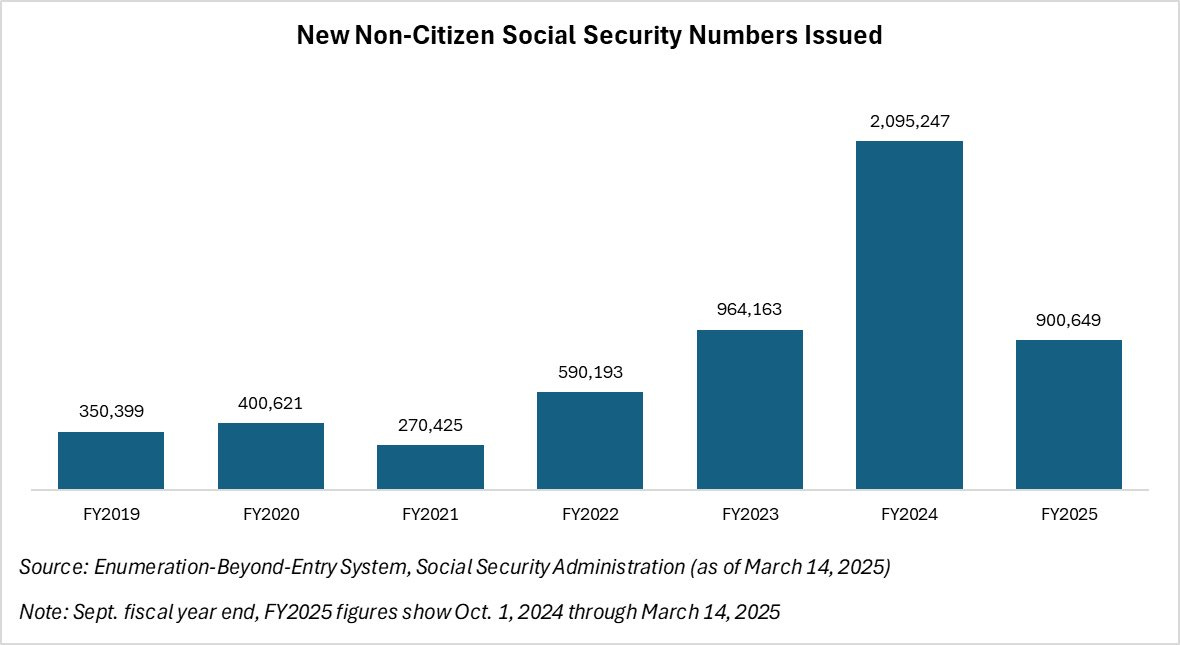Immigration Surge Exposed: How 2.1 Million Non-Citizen Social Security Numbers Threaten Liberty and Taxpayer Funds in 2024
Antonio Gracias’ All-In Podcast Revelation Highlights Voter Fraud Risks and Medicaid Strain—Why Americans Deserve a System That Prioritizes Citizens First
In a recent episode of the super-popular All-In Podcast, immigration data were discussed, and an alarming trend was shown. This trend should concern any American who values limited government, individual liberty, and the integrity of our voting process. Podcast guest Antonio Gracias, an immigrant himself and a lifelong Democrat, presented data that exposes the urgent need for a system that allows for the free movement of people while tightening up the welfare state so the billions forcefully collected by our government via taxes for social programs like Medicaid go toward American citizens.
The podcast’s conversation centered on information presented by Antonio Gracias, exposing a dramatic surge in Social Security numbers issued to non-citizens—from a baseline of 300,000–400,000 per year in 2019 to a staggering 2.1 million in 2024. This spike, attributed to expanded asylum and parolee programs, involved 5.4 million people, including 1.2 million with unknown status, highlighting a systemic failure in oversight and accountability. It is important to note that the numbers presented were Enumeration Beyond Entry ("EBE") immigrants. The rationale for using those is that it ramped directly from growth in the various asylum programs that became abused as a way to get into the country. It is important to note that social security numbers are issued to non-citizens so they can work and the government can collect taxes from them. More on this later.
Almost immediately after this chart was put up on March 31, 2025, haters came out challenging the numbers as inaccurate, but the haters were using different data sets. As Antonio explains in response to those haters in an X post, “The data we showed in our slide last night in Wisconsin was just Enumeration Beyond Entry ("EBE") immigrants. The difference is Enumerations at Field Offices. These have remained stable at about 1 mln/year excluding COVID. We focused just on EBE because it ramped as a direct result of growth in the various asylum programs. Your chart mixes the two categories: showing all immigrant Enumerations from 2016 thru 2020 and EBE only from 2021 to 2024. Here is the chart back to 2019 for Enumeration Beyond Entry which is when the EBE basically started. I want to thank the good people at the Social Security Administration for their expert help. We would not have been able to understand this complex system without them. There are many terrific people at SSA serving their fellow citizens. We are very grateful. I believe these facts speak for themselves. As the son of legal immigrants to America, I am an ardent supporter of legal immigration.”
The data uncovered serious issues: the process for issuing Social Security numbers lacks basic ID verification, with many records missing identifying checks. This lax approach has led to thousands of non-citizens registering to vote across several states, with some even casting ballots, raising the specter of potential voter fraud. Now, whereas I do not believe the numbers are large enough to sway a presidential election, they could sway closer elections. Additionally, 1.3 million of these individuals are enrolled in Medicaid, leaving less of the pie for American citizens while straining public resources. Antonio also noted the human toll, mentioning high suicide rates among border agents overwhelmed by the surge in illegal immigration, which USA Today wrote about last year.
From anyone’s perspective, this situation is a textbook example of abuse of our social welfare system and how inefficient our government really is. The expansion of Social Security access to non-citizens, which began in the 1990s, represents a departure from its original purpose of supporting American citizens. The lack of verification in issuing these numbers undermines the rule of law and erodes the integrity of our electoral system, becoming a challenge for our free society. While on the federal level, it is illegal for a non-citizen to vote in a federal election, that is not the case in some states where non-citizens can vote in state-level elections on down to the local level. The potential for voter fraud, as evidenced by the thousands of non-citizens registered to vote, threatens the principle of self-governance, where only citizens should determine the nation’s future.
The drain on resources of our social services like Medicaid exemplifies how unchecked immigration policies can lead to the misuse of taxpayer funds, violating our founding principle of minimal government intervention in the economy. Antonio wants our government to identify “criminals, terrorists, and people mooching off the system” while we must protect individual rights and property from exploitation. However, this must be balanced against the risk of heavy-handed enforcement that could infringe on personal freedoms.
The political implications are equally troubling. Antonio warned of long-term consequences, citing California as an example where lax immigration policies have shifted the electorate, potentially entrenching one-party rule—a scenario we should all dread, as it kills political competition and individual governance choices. While Antonio insisted the data is non-political, the broader context suggests that current policies could reshape the voter base, undermining our political process.
The discussion concluded with a call to action: refer the data to the National Targeting Center, publish the list of non-citizen voters, and determine a course of action to address these issues. For Americans, the path forward should focus on dismantling the bureaucratic mechanisms that enable such failures—like the unchecked expansion of Social Security to non-citizens—while ensuring any reforms prioritize transparency, accountability, and the protection of individual liberty.





